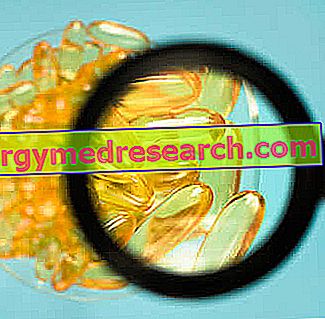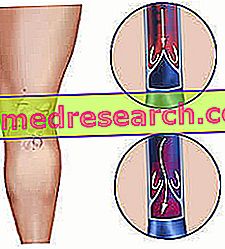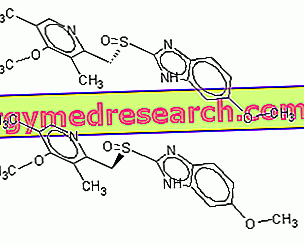What are Omega 3s?
Omega 3 is a group of fatty acids, respectively called alpha linolenic acid (ALA), eicosapentaenoic acid (EPA) and docosahexaenoic acid (DHA).

The omega three are polyunsaturated essential fatty acids (PUFA) and contain some double bonds positioned between the carbon atoms.
They cover many vital functions or in any case extremely important for health. However, in addition to being scarcely present in foods, omega-3s are easily damaged.
By virtue of their sensitivity to degradation, and of the many vital or healthy functions, today these essential fatty acids (AGE) are extremely widespread and marketed in the form of supplements.
Supplements
Omega Three in Supplements
Omega 3 supplements are used to prevent or compensate for a possible nutritional deficiency and to take advantage of the beneficial effect that they exert on "wellness pathologies".
The omega three supplements may contain ALA, which is of vegetable origin, and / or EPA and DHA, which belong mainly to underwater organisms such as fishery products.
In particular, the sources of omega three most used to formulate food supplements are:
- For ALA: oilseeds, germ or embryo of other types of seeds and related extraction oils.
- For EPA and DHA: cold sea fatty fish (such as salmon), blue fish (like mackerel), fish liver and extraction oil (such as cod), krill and extraction oil, algae and extraction oil, others (like the squid one) etc.
Quality
Why is Integrator Quality Important?
As we have mentioned, omega 3 is easily perishable nutrients.
They particularly suffer from the negative effect of:
- Oxygen
- Free radicals
- Light
- Heat.
This applies as much to food supplements as to foods.
On the other hand, the omega three contained in "natural" foods (unprocessed or extracted) are less susceptible than supplements.
This happens for:
- Greater protection from sunlight
- Greater protection from atmospheric oxygen
- Presence of antioxidants such as vitamin E, especially in organisms of plant origin.
The foods have a limit of edibility that can favor the intake of omega 3 "healthy" at the expense of those emaciated. The food depleted of omega three is almost always "badly preserved". This, losing all the characteristics of pleasantness necessary for consumption, is replaced by a healthy, fresh and rich in active omega 3.
These assumptions show the importance of identifying a quality standard for omega 3 supplements.
Omega Three Supplements: Establishing Quality?
"Quality" is a fairly complex feature.
Referring to omega three supplements, it covers all aspects of the production cycle, from the selection of raw materials to the final composition.
The quality of omega 3 products is measurable and measurable. In fact, in addition to the basic requirements imposed by law (which can change from one country to another), the best companies turn to specialized bodies that issue various quality certifications.
Regarding omega three supplements, the most important certifications are two: FOS and IFOS ™.
FOS certification
FOS means "Friend of Sea".
It is a non-governmental and non-profit organization founded by Paolo Bray (European Director of the Earth Island Institute for the Dolphin-Safe project).
FOS issues a quality certification focused on the evaluation of eco-sustainability and is based on the most recent scientific studies.
The FOS-branded products (especially anchovies, sardines, tuna and Antarctic krill clippings), fished or aquaculture, are obtained respecting the criteria of conservation and protection of the marine habitat.
Furthermore, the Friend of Sea favors small entrepreneurial activities (which represent 50% of FOS production), guaranteeing reduced, affordable and sustainable operating costs.
Today, food supplements (or the raw materials used) that are supported by Friend of Sea come from all over the world and include: feed, fish species, fish oil, etc.
The controls are operated by international and independent agencies, which fully comply with the guidelines established by the FAO (Food and Drug Administration).
IFOS ™ certification
IFOS means "International Fish Oil Standards" (international fish oil standards).
It is an independent organization that analyzes the compositional quality of fish oil and estimates: the percentage of omega 3, the presence of contaminants and chemical and physical stability.
Composition
Many fish oils contain significant amounts of omega 7 rather than omega 3; IFOS guarantees that the supplement is indeed a wonderful source of EPA and DHA.
pollutants
Unfortunately, the sea is rich in pollutants diffused by industrial activity (heavy metals, dioxins, etc.). These contaminants can enter the body of fishery products and from there into the supplements based on extracted oil. IFOS checks that the levels of these unwanted elements are within the norm.
Integrity
We know that omega 3s are unstable molecules, in particular EPA and DHA of animal origin. The conservation of raw materials, the method of extraction and storage, as well as the total path of the finished integrator, can negatively affect the stability of the omega-three making them go rancid. IFOS ensures that essential fats are intact, metabolically active and non-harmful.
Why use them?
The most common omega 3 supplements contain mainly docosahexaenoic and eicosapentaenoic acid.
It is common to define ALA, EPA and DHA as "essential fatty acids" (AGE).
However, the only really necessary is (or should be) alpha linolenic acid (which the human body uses as a substrate to obtain the other two).
This does not mean that eicosapentaenoic acid and docosahexaenoic exercise various decisive functions, especially for the fetus, for the child, for the elderly, for the heart patient and for those suffering from metabolic disorders. This is why today research institutions urge the population not to underestimate its nutritional importance.
In the past, importance was given exclusively to the total sum of the omega three present in the diet, while the new recommendations establish a minimum level of safety also for EPA and DHA. Today, in fact, we are aware of the fact that a possible "metabolic defect" (old age, drugs, etc.) can compromise the transformation of ALA in the EPA and DHA derivatives, favoring their deficiency and consequently increasing their nutritional requirements.



